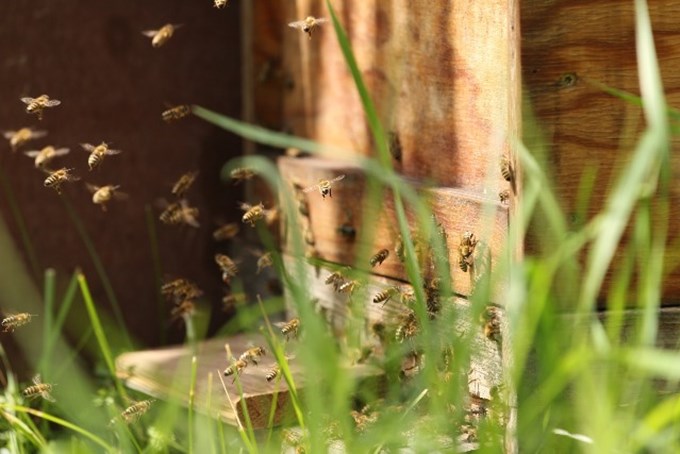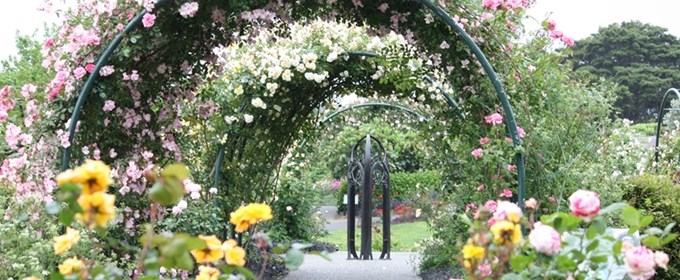
As much as we love bees, many home gardeners are inadvertently damaging them in the process of creating the perfect garden.
Fun fact: Bees and wasps can not only recognise the faces of their peers – they can also distinguish human faces!
Check the spray
Pesticides and some herbicides have the potential to be harmful not only to pests but also to pollinators - they don’t discriminate between good and bad insects, so just deal to them all. If not used correctly, some can also end up in streams, ponds, or rivers.
Pesticides is the term used to describe a chemical or biological agent that discourages (deters, incapacitates or kills) pests – both plants and insects. It includes herbicides, insecticides, insect and animal repellants, fungicide and disinfectant.
One of the biggest threats to pollinators, including bees, is the use of insecticides containing neonicotinoids in home gardens. Neonicotinoids persist in the environment for a long time and continue to impact bees after the initial spraying. They are also highly addictive to bees, which keep bringing them back to the hive and killing them from the inside.
Auckland Council restricts its use of herbicides to those which have been approved for use by the Environmental Protection Authority (EPA). The main herbicide we use for general vegetation management is glyphosate, which has been assessed by the EPA as being non-toxic to bees.
Embrace natural abundance
Auckland Botanic Gardens went chemical free in 2000; a move that manager Jack Hobbs says was quite bold and controversial at the time.
The immediate implications for the Rose Garden were significant with many rose cultivars becoming unhealthy. However the excellent health of our roses today is testament to the success of our spray-free regime.
It’s also seen the content of many gardens and plant collections change, as high performing plants that remain healthy without pesticide intervention have replaced unhealthy plants.
Now, says Jack, the gardens have never been healthier and the pollinators – including bees – love it.
He estimates that half the roses in the marketplace can be grown without spray and, of these, a small percentage are absolutely magical in their performance.
Jack says the experts at Auckland Botanic Gardens are one of the best sources of recommendations for plants that will flourish without sprays and are suited to Auckland’s conditions, as well as advice on what other plants to combine them with, and how to treat them throughout the year.
“The thing to aim for is an abundance of life – the more the better, because the beneficial bugs sort out the ones you don’t want. I’d really encourage home gardeners to harness the power of nature and let it do the work; the hourly rate is really good!”
Alternative weed control
Instead of reaching for the herbicide sprays Jack recommends the following:
- Mulch your garden and you won’t get as many weeds
- Before you mulch, lay down old cardboard and you won’t have weeds for months (it also makes space in your recycling bin!)
- Rather than spray edges to create a mowing strip try an edger
- Look at what you’re using – pavers require more weed control than concrete
Jack is keen to continue trialling alternatives to herbicides such as steam at the Botanic Gardens and says the challenge is finding an effective system of application on a large scale. In the meantime the Gardens restricts herbicide use to paths and other non-cultivated areas.

Tips for bee-friendly spraying and gardening
Auckland Live’s Hives experts, who look after inner city hives, recommend considering growing organically, or using bee-friendly sprays. Even better, use them only at dusk when the bees are in their hives. Also,
- Avoid spraying when plants are in flower. But, if you need to, don’t spray the flower/pollen itself.
- Spray in the early evening as the bees are not foraging until the next day, giving time for the pesticide to disappear off the plant overnight.
- Grow plants in your garden that attract bees. Bees love plants with ample amounts of pollen and nectar such as borage, lavender, rosemary, calendula and forget-me-not. Remember bees are attracted to these colours: yellow, blue-green, blue and ultraviolet flowers
- Don’t mow your lawn too often, and leave clover and dandelion in the lawn for a while for bees to forage on.
- If you come across a swarm of bees please don’t call the exterminators, but instead contact your local beekeeping club. ApiCulture NZ has some contact numbers on their website.
- Make sure you learn the difference between a wasp nest and natural beehive.
Want more?
Auckland Botanic Gardens is running a guided walk on “Pollination & Pollinators at your place” on 10 October from 11am to 12pm and 19 October from 1pm to 2pm. The walks focus on native plants and their pollinators, and how to encourage them into your garden to help your fruit trees and veggie patch.
More information on this and other free events can be found on the Auckland Botanic Gardens website.

